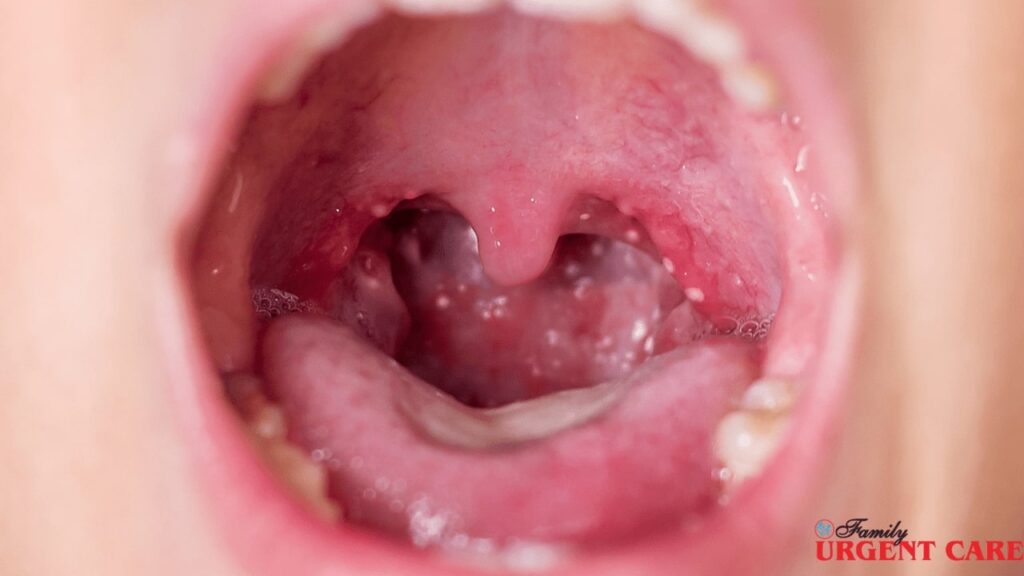Imagine waking up with a sore throat, fever, headache and swollen tonsils. You might wonder if these symptoms are due to a viral or bacterial infection and how you can get rid of the throat pain faster.
Swelling in tonsils can be due to various reasons; therefore, an important key is to find the underlying cause so that you can take the right steps to manage the cause at home. However, if tonsillitis occurs due to bacteria, visiting a nearby doctor might be necessary for proper evaluation and treatment.
So, don’t let swollen tonsils wreak havoc on your bustling routine, and read further to find the solution to get quick relief.
| A quick note about tonsils:Tonsils are tiny fleshy masses at the back of your throat that play a crucial role in stopping germs from entering your mouth or nose. If you notice redness, swelling, pain, white spots or difficulty in swallowing, you might be suffering from tonsilitis (inflammation in the tonsils). |
Why Are My Tonsils Swollen?
We all can relate to the persistent discomfort that comes with swollen tonsils. Having a sore throat, difficulty in swallowing and throat pain can make it difficult for you or your child to engage in daily chores.
But before you explore some ways to get rid of swollen tonsils, the first step is to identify the cause. There are various reasons that you or your child may experience inflammation in the tonsils. These include:
1. Viral Tonsillitis
In most cases, acute tonsillitis occurs due to a viral infection, accounting for 70-95% of cases, as reported by one study.
Some common viruses that cause swollen tonsils in children and young adults are:
- Adenoviruses: These viruses cause fever, severe throat pain, difficulty in swallowing and exudative tonsillitis.
- Epstein-Barr Virus (EBV): It is a human herpes 4 virus from the Herpes family that causes mononucleosis in children, which spreads through infected saliva.
- Influenza Virus: This is commonly known to cause flu and sore throat in children and adults. Some characteristic symptoms of flu are sore throat, stuffy nose, headache, cough and swollen tonsils.
In adults, most cases of mild to moderate tonsillitis are reportedly caused by rhinovirus, HIV and coronavirus. Generally, viral tonsillitis is less severe and can resolve with symptomatic treatment.
However, if your child experiences any concerning symptoms like sore throat, fatigue, loss of appetite, difficulty swallowing or fever, you can consult our medical experts for proper examination and treatment.
2. Bacterial Tonsillitis
Swollen tonsils can also be caused by a bacteria namely Streptococcus pyogenes which is also known to cause strep throat. Bacterial tonsillitis is most common in children and young adults between the ages of five to fifteen. However, adults can also suffer from severe bacterial infection.
A person with bacterial tonsillitis might experience severe throat pain, sore throat, fever accompanied by chills and more pronounced headaches and body aches.
If you’re a parent who’s lost in a misty fog about whether your child has bacterial or viral tonsillitis, you can visit our urgent care clinic for an accurate diagnosis and complete treatment.
Our qualified health practitioners will perform a proper throat exam and after assessing your signs and symptoms, a proper treatment plan for tonsilitis will be recommended.
How To Get Rid Of Swollen Tonsils Fast?
The treatment strategy for tonsilitis depends on the severity of the symptoms and the cause. Viral tonsillitis can improve within a week with at-home care and over-the-counter medications.
However, if you have bacterial tonsillitis, a proper course of antibiotics is necessary to kill the bacteria in the body. Your doctor may also recommend OTC drugs for easing the pain like
- Pain relievers such as acetaminophen and ibuprofen
- Throat lozenges (menthol or benzocaine)
- Antihistamine (loratadine and diphenhydramine)
- Nasal decongestants
If you have recurrent tonsillitis with severe throat pain and difficulty in swallowing, you need to visit a doctor nearby for further evaluation and consideration of other treatment options, with tonsillectomy (removal of tonsils) as a last resort.
At-Home Care For Swollen Tonsils
Whether you’ve bacterial or viral tonsillitis, you can take some steps to relieve the persistent discomfort from swollen tonsils at home. Here are a few home remedies that you can follow:
- Saline Water Gargle: Saline or salt water has antimicrobial properties and gargling with warm water can soothe sore throat and reduce inflammation.
- Lozenges For Sore Throat: Some lozenges contain natural anti-inflammatory ingredients that can reduce throat pain and swelling in tonsils.
- Ginger Tea With Raw Honey: Simmer the ginger in warm water and add a tablespoon of honey. The anti-inflammatory and antimicrobial properties of ginger and honey may soothe your throat and help you swallow.
- Popsicles or Ice cream: Frozen drinks or popsicles can help treat pain, inflammation and swelling, especially in young children, as the chilliness may numb the sore throat temporarily.
- Use a Humidifier: Dry air can irritate a sore throat so leaving your humidifier at night can help in removing the dryness from the air.
How Long Do Swollen Tonsils Last?
In the majority of cases, swollen tonsils or tonsillitis can go away within three to seven days. But if your symptoms last longer than a week or you’re experiencing other concerning symptoms like fever, body aches or severe throat pain, it is better to schedule a visit to your healthcare provider to rule out the cause.
When To Contact A Doctor For Swollen Tonsils?
Receiving an accurate for you or your child is necessary if you’re suffering from any concerning symptoms that indicate an infection in the tonsils.
Keep an eye on the following symptoms as they might indicate an underlying infection that requires a doctor’s attention. See a doctor if you or your child experiences any of the following symptoms along with swollen tonsils and throat pain:
- Fever along with chills
- If your symptoms don’t go away within a day or two
- Difficulty in swallowing due to severe throat pain
- Body aches, tiredness or fatigue
Some serious symptoms that might be a red flag to get immediate care are:
- Extreme difficulty in swallowing with severe throat pain
- Excessive drooling due to obstruction of the normal passage of saliva
- Difficulty in breathing due to pronounced swelling in tonsils
Not to mention, if your overall symptoms do not improve within a week even after taking over-the-counter medicines, consult a healthcare provider immediately.
How Can Family Urgent Care Help In Treating Swollen Tonsils?
Whether you’re confused about relieving swollen tonsils at home or your child has been experiencing recurrent sore throat for the past few months, you can consult our urgent care doctors and healthcare providers for a proper consultation.
Once you visit our clinic in Illinois or Indiana, our healthcare providers examine your throat for redness, swelling, or white spots. After the throat examination, the provider asks you about your symptoms, medical history, or any allergies that might have triggered the inflammation process.
If the provider suspects a bacterial infection, then a throat culture might be done to rule out the bacteria that has caused swollen tonsils.
The doctor will prescribe appropriate medicines such as pain relievers, anti-inflammatory medicines and antibiotics, if necessary.
So, do not let the swollen tonsils hold you back. You can take the first step towards relief by booking your consultation today.

